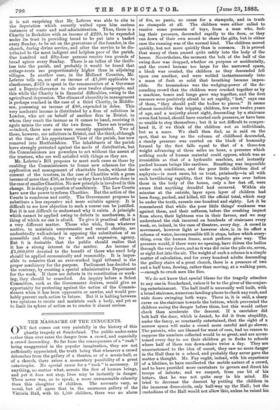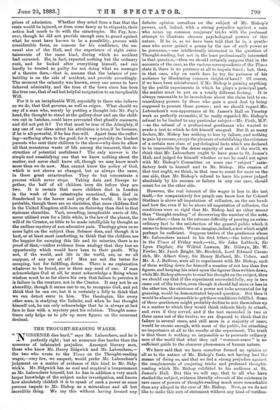THE MASSACRE OF THE INNOCENTS.
ONE fact comes out very painfully in the history of this ghastly tragedy at Sunderland. The public under-rates rather than over-rates the danger from a crowd, and especially a crowd descending. So far from the consequences of a " rash " being exaggerated in the popular imagination, they are not sufficiently appreciated, the truth being that whenever a crowd debouches from the gallery of a theatre, or of a music-hall, or of a church, there arises a momentary possibility of a great catastrophe. No special cause for a " rash " is necessary. If anything, no matter what, arrests the flow of human beings, and yet it does not stop, lives may be instantly in danger. There never was, so to speak, a more unreasonable calamity than this slaughter of children. The accounts vary, as usual, but all agree that in the enormous gallery of the Victoria Hall, with its 1,500 children, there was no alarm
of fire, no panic, no cause for a stampede, and in troth no stampede at all. The children were either called to receive some presents of toys, from a man who, feel- ing their pressure, descended rapidly to the floor, or they ran down of their own accord to share the gifts, but in either case the running was of the normal kind. The children moved quickly, but not more quickly than is common. It is proved that many of them passed quite safely into the body of the house. Nevertheless, the moment the bolt of the half of the swing door was dropped, whether on purpose or accidentally, and the crowd became too large for the narrowed space, a block was created, the children as they descended fell upon one another, and were welded instantaneously into a mass of flesh so solid that breathing became impos-
sible. So tremendous was the wedging-power of the de- scending crowd that the children were crushed together as by a machine, bones and lungs gave way together, and the first rescuers were positively afraid to act rapidly, " lest," says one of them, " they should pull the bodies to pieces." It seems almost incredible that tripping children, few over twelve years of age, and a majority about eight, descending by a staircase seven feet broad, should have exerted such pressure, or have been so unable to stop themselves ; but it is not difficult to compre- hend it, if we think of the children not as individuals, but as a mass. We shall then find, as is said on the spot, that as long as the column of childhood descended, a steady pressure was exerted on the block of humanity formed by the first falls equal to that of a three-ton weight advancing at three miles an hour, a pressure which nothing made of human material could oppose, which was as irresistible as that of a hydraulic machine, and instantly packed human beings like sardines. Breathing was impossible under such conditions, and the poor little children died of asphyxia—in most cases, let us trust, painlessly—in all with such bewildering rapidity, that the tragedy was over before those in the body of the house, only a few feet off, were aware that anything dreadful had occurred. Within six minutes at the outside, layer upon layer of children had been flung, packed, and killed, till the official total, which may be under the truth, exceeds one hundred and eighty. Let it be remembered that while the poor little things' weakness was against them, and their softness, before the crushing impact from above, their lightness was in their favour, and we may understand the risk incurred on hundreds of staircases every week, or, indeed, in the case of theatres, every day. A crowd in movement, however light or however slow, is . in its effect a column of water, incompressible till it stops, before which every- thing, even the human frame, must perforce give way. The pressure would, if there were no opening, have driven the bodies through the very doors, and as it was did raise the pile six, seven, or eight feet into the air. The weight of such a column is a simple matter of calculation, and for every hundred adults descending the gallery stairs of a great church, there is a pressure of two and a half tons, flowing, rather than moving, at a walking pace, —enough to crash men like flies.
We do not know that special blame for the tragedy attaches to any one in Sunderland, unless it be to the giver of the conjur- ing entertainment. The hall itself is unusually well built, with a broad staircase, numerous landing-places to check any rush, and wide doors swinging both ways. There is, it is said, a sharp curve on the staircase towards the bottom, which prevented the children seeing the danger before them, but this would rather check than accelerate the descent. If a caretaker did bolt half the door, which is denied, he did it from stupidity, under the fancy, so constantly entertained, that the sight of a narrow space will make a crowd more careful and go slower. The parents, who are blamed for want of care, had no reason to suppose the numbers collected would be so great, and are accus- tomed every day to see their children go in flocks to schools where half of them run down-stairs twice a day. They are unaccustomed to the idea of escort, they saw no more danger in the Hall than in a school, and probably they never gave the matter a thought. Mr. Fay ought, indeed, with his experience of a lifetime, to have recollected the mobile nature of a crowd, and to have provided more caretakers to govern and direct his troops of infants; and we suspect, from one bit of his letters, that he was not quite easy in his mind. He tried to decrease the descent by putting the children in the immense dress-circle, only half-way up the Hall; bat the custodians of the Hall would not allow this, unless he raised his
prices of admission. Whether they acted from a fear that the seats would be injured, or from some fancy as to etiquette, their action had much to do with the catastrophe. Mr. Fay, how- ever, though he did not provide enough men to guard against what he must have known to be a possibility, presses with considerable force, as reasons for his confidence, the un- usual size of the Hall, and the experience of eight enter- tainments of the same kind, during which no accident had occurred. He, in fact, expected nothing but the ordinary rush, and he looked after everything himself, and can hardly be treated as guilty for not doing what no manager of a theatre does,—that is, assume that the balance of pro- bability is on the side of accident, and provide accordingly. The moment the calamity was known, every one seems to have behaved admirably, and the tone of the town since has been the true one, that of sad but helpful resignation to an inexplicable Will.
For it is an inexplicable Will, especially to those who believe, as we do, that God governs, as well as reigns. What should we say of a man who, merely by putting a thought into Mr. Fay's head, the thought to stand at the gallery-door and see the child- ren out in batches, could have prevented that ghastly massacre, and did not put it ? Yet that must be true of the Almighty, if any one of our ideas about his attributes is true, if he foresees, if he is all-powerful, if he has free-will. Apart from the suffer- ing—suffering often to the good, for it was probably the kindest parents who sent their children to the show—why does he allow all that monstrous waste of life among the innocent, that de- struction of potential usefulness ? The only answer is the simple and unsatisfying one that we know nothing about the matter, and never shall know all, though we may know much more than we do now. Man cannot know the policy of God, which is not shown as changed, but as always the same, in these great catastrophes. They do but concentrate a process which never stops. Taking Asia and Europe to- gether, the half of all children born die before they are two. It is certain that more children died in London in the week of the catastrophe unnoticed, than died in Sunderland to the horror and pity of the world. It is quite probable, though there are no statistics, that more children died in the United Kingdom still-born on Saturday than died in that staircase shambles. Vast, unending, inexplicable waste of life, never utilised even for a little while, is the law of the planet, the will of its Creator, as little to be made intelligible by thought as the endless mystery of non-educative pain. Theology gives us no more light on the subject than Science does, and though it is best, or at least most comforting, to think that the children are the happier for escaping this life and its miseries, there is no proof of that,—rather evidence from analogy that they lose an opportunity which would have been to their profit. Why not, if the world, and life in the world, are, as we all suppose, of any use at all ? Men are not the better for escaping, but for fulfilling, duties. There is no explanation whatever to be found, nor is there any need of one. If man acknowledges God at all, he must acknowledge a Being whose wisdom must be so far above his own that failure to perceive it is failure in the creature, not in the Creator. It may not be an absurdity, though it seems one to us, to recognise God, and yet think that he can err, but it is certainly a folly to think that we can detect error in him. The theologian, like every other man, is studying the Infinite, and when he has thought himself out, he can only acknowledge that he is always at last face to face with a mystery past his solution. Thought some- times only helps us to pile up more figures on the recurrent decimal.



































 Previous page
Previous page